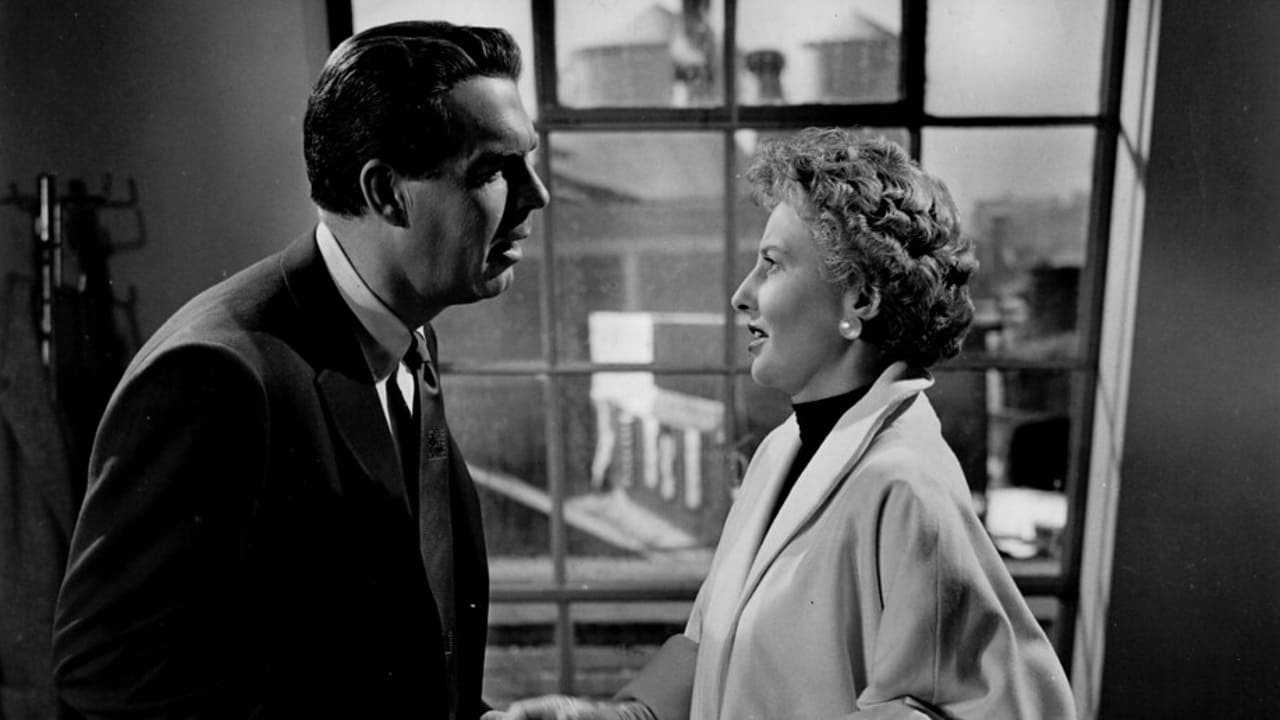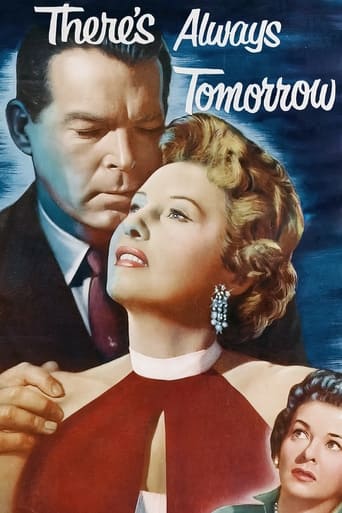

Virtually unknown among Sirk's catalog, which is reasonably when you consider his classic films like 'All That Heaven Allows' and 'Imitation of Life.' But for a film this good to have not seen a DVD release is criminal. I had the good fortune of being able to see this gem at a public screening this week. This is easily one of the best films to come out of the studio era. The film concerns Clifford Grove (Fred MacMurray) a toy developer, whose family neglects him. His wife bails out on their plans constantly, for the children, and the children pay no attention to their loving father. Clifford runs into an old flame, who is back in town and begins to innocently spend some time with her while she's in town. But his sneaky children become suspicious of his activities and start to follow him, his son begins to convince his siblings that their father is having in affair. Their begin to psychological torment their father and ultimately drive him to desire leaving his family. It's painfully dark, and Fred MacMurray is brilliant. The psychological effect on the viewer is tremendous. It's dark and hopeless. If children were shown this on the advent of puberty, no one would ever get married. The stark black and white cinematography is always telling more than the story, with sneaky, sweeping pans and dollies the film keeps you guessing the duration. It's the kind of backhanded studio film, that was rarely produced, where the director gives the audience only ambiguities for resolution, cyclical images void of hope for Clifford, but ambiguous enough to get by censors at the studio, enough to imply that maybe things turned out for old Clifford. This is studio-era cinema at it's best. If you get a chance to catch a screening of it on the new 35mm that is, supposedly, circulating art-house cinemas around the U.S., go. It's a shame that it is not more widely available, a radiant film from the 50s (though troubled and moderately sexist, symptomatic of the time period, but not so blatant that it can't be overlooked in the same way that critics can overlook the racism in 'Birth of a Nation').
... View MoreDouglas Sirk is renowned for injecting his subversive criticism of American society of the fifties in his glossy and glamorous melodramas. What made this palatable to the public, who flocked in droves, was the fact that the families involved were showbiz families ("Imitation of Life"), filthy rich oil magnates ("Written in the Wind") or highly idealized to the point of caricature ("All that Heaven Allows", "Magnificent Obsession"), far from the average movie goers own social milieu. And of course up there on the screen were the glamorous stars, Rock Hudson, Lana Turner, Lauren Bacall, Dorothy Malone, etc. Movie fans will recall the aforementioned movies when the topic of Sirk's movies arises. It is highly unlikely that "There's Always Tomorrow" will get a mention. "There's Always Tomorrow" has barely any gloss or glamour. The social criticism is completely without disguise. The family in question is one that the vast majority of movie goers could very easily identify with. Its stars (Fred MacMurray and a not so young Barbara Stanwyk) are not glamorous. While audiences left the cinema entranced by the glorious melodrama of "Imitation of Life" and "Written on the Wind", they would have left "There's Always Tomorrow" feeling a lot less secure about their own lives, since it's a film that touches on a fair amount of "dangerous" territory, calling into question the very foundations of the American family. Douglas Sirk's sense of irony has never been sharper. The title brims with optimism and the film opens with the script, "Once Upon a Time in Sunny California". But what unfolds is a bleak, pessimistic depiction of middle class family life.While Sirk's films have often been branded "woman's pictures", "There's Always Tomorrow" is indeed very much a man's picture. It takes a hard and deep look at the role of the male breadwinner and the picture it comes up with is not a pretty one. What we are shown is a man who when young, courted the prettiest girl, married, had children and worked hard to build up a successful business. He is now middle aged and having achieved it all, begins to feel himself taken for granted by his wife and children. His needs are completely neglected. His wife has little interest in him sexually being totally wrapped up in fulfilling the unending needs of their self centered ungrateful children. It's a scenario all too familiar to millions of men. Fred MacMurrays's Clifford Groves has become a robot similar to the one his successful toy manufacturer has created. No wonder that Norma Vale's (Stanwyk) reappearance in his life presents an opportunity to regain his lost dreams. She's an independent career woman, who sees his situation as somewhat idyllic from the outside. But with the usual intelligence of a Stanwyk character, she has no illusions as to a possible future with him. Despite the brief and obligatory conciliatory ending, Clifford Groves' future does not bode well. It should come as no surprise that the film was not well received at the box office. "There's Always Tomorrow" has many of the hallmarks of Sirk's craftsmanship. The studio refused to grant him his request for the film to be shot in color, despite having provided Universal with some of its highest grossing pictures of the decade. At least his demand for his favorite cameraman Russell Metty was granted. Metty as always, was the perfect partner in realising Sirk's vision. His interior filming in particular is a lesson in cinematography. He had a penchant for shooting characters behind banisters, framed in mirrors and caged behind fences to enhance the sense of their being trapped. MacMurray and Stanwyk are constantly gliding through dark shadow and bright light reflecting the inherent brightness and darkness in their lives. At this point of writing "There's Always Tomorrow" has not been released in any format and rarely gets a showing on television. It's a gross injustice to an extremely important director and a wonderfully made, moving piece of cinema.
... View MoreTypical soap opera by director Douglas Sirk (albeit less glossy than his earlier technicolour offerings of "Magnificent Obsession" and "All That Heaven Allows", and certainly less well-known). Having read the comments posted by other viewers about this film, I must confess that I don't quite share their enthusiasm. Although generally well done (and nicely filmed in black-and-white), "There's Always Tomorrow" really offers nothing special in terms of the story line (hard-working, successful businessman Fred MacMurray feels neglected by wife Joan Bennett and their three children, meets old flame Barbara Stanwyck, considers having an affair). However, the film does move along at a good pace, and will certainly hold your interest. The children's perspective of the situation (particularly grown-up child William Reynolds, the oldest of the three) is well presented. The lead roles are very capably acted by old pros MacMurray and Stanwyck, but their re-teaming hardly compares to the dynamic fireworks they displayed in their earlier film, the undeniably great "Double Indemnity". All in all worthwhile, but I wouldn't rank it amidst the classics.
... View MoreIt's always a pleasant surprise to encounter an 'oldie' movie such as this. As for first impressions, I have the feeling it's an idealist's wished-for 'dream of a perfect world and perfect people' that never quite comes true, unfortunately, for many in real life. At times the story seemed a bit too melodramatic and predictable at every turn yet even so I enjoyed itBarbara Stanwyck as Norma is always able to carry a dramatic role superbly. Fred MacMurray as Clifford certainly does give a true rendering of a situation many married men find themselves in sooner or later, of facing middle age and the feeling of being boxed in on all sides. Well worth adding this one to your collection.
... View More